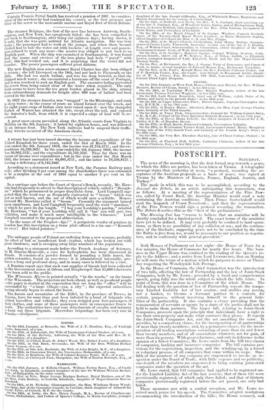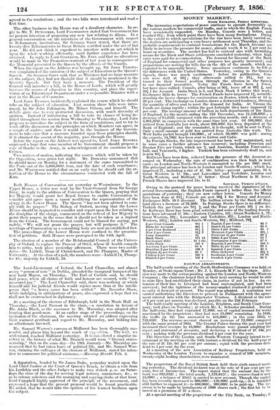Both Houses of Parliament sat last night-the House of Peers
for a few minutes, the House of Commons for nearly five hours. The busi- ness in the Upper House was confined to the reading of the Queen's re- ply to the Address ; and a notice from Lord LYNDHURST, that on Monday he will state the terms of a motion which he purposes to move on Thurs- day respecting the Wensleydale Life Peerage.
In the House of Commons, the chief transaction was the introduction of two bills, affecting the law of Partnership and the law of Joint-Stock Companies, both by Mr. LOWE ; preceded by a lucid and comprehensive speech, going fully into the whole subject to which the bills relate. In point of form, this was done in a Committee of the whole House. The bill dealing with the question of law of Partnership repeals the tempo- rary Limited Liability Act of last session ; and enables any person, not a banker, to become a dormant partner in a concern for certain purposes, without involving himself in the general liabi- lities of the partnership. It also contains a clause pthviding that the remuneration of servants or agents by a share of the profits shall not be held to make them partners. The larger bill, relating to Joint-Stock Companies, proceeds upon the principle that individuals have a right to use their own property and make what contracts they please. It repeals the Joint-Stock Companies Act, and the act amending the same. It provides, by a compulsory clause, for the incorporation of all partnerships of more than twenty members ; and, by a permissive clause, for the incor- poration of all trading associations consisting of more than six and fewer than twenty members, and of all associations whatever, not for gain, of more than six persons. With great reluctance, and only in deference to the opinion of a Select Committee, Mr. Lowe omits from the bill two classes of companies, banking and insurance companies. The bill contains pro- visions for the registration, inspection, and the winding-up, by a forced or voluntary process, of all companies that come within its scope. One- fifth of the members of any company are' empowered to invoke an in- spection under the Board of Trade, with little expense and no publicity; one-fourth of the members are empowered to bring existing joint-stock companies under the operation of the act.
Mr. Lowe stated, that 142 companies had applied to be registered un- der the Limited Liability Act of the last session ; that of these 121 were provisionally registered, of which only three failed ; and that of thirteen companies provisionally registered before the act passed, one only had failed.
These measures met with a cordial reception, and Mr. Lowe re- ceived much praise for his speech. The Committee adopted resolutions recommending the introduction of the bills ; the House resumed, and agreed to the resolutions ; and the two bills were introduced and read a first time.
The other business in the House was of a desultory character. In re- ply to Mr. T. DUNCOMBE, Lord PALMERSTON stated that Government has no present intention of proposing any new law relating to Aliens. In a general conversation on the intentions of the Government with respect to Reformatory institutions, Sir GEORGE GREY stated, that there are twenty-five Reformatories in Great Britain certified under the act of last year. He did not think it expedient to interfere with an act which is upon the whole working efficiently, until further experience has been obtained. In reply to Lord Gonemen, Mr. PEEL said that no alterations would be made in the Promotion-warrant of last year in consequence of the Memorial presented to the Queen by the officers of the Guards.. When the report on the Address was brought up, Sir Joux PARING- TON complained of the omission ef the subject of Education in the Queen's Speech. Sir GEORGE GREY said, that as 'Ministers had no large measure on the subject, they had not thought that it should be mentioned in the Queen's Speech. But they have a measure. The President of the Council will introduce a bill, in the House of Lords, which will greatly increase the means of education in this country, and place the super- vision of an Educational Department under a responsible Minister with a seat in the House of Commons.
Lord Jou x Ressms. incidentally explained the course which he should take on the subject of education. Last session three bills were intro- duced, by Sir John Pakington, Mr. Milner Gibson, and himself. The details gave rise to very protracted discussion, with much diversity of opinion. Instead of introducing a bill to take its chance of being de- bated throughout the session from 1Vednesday to Wednesday, Lord John proposes to introduce the subject in the form of resolutions, and to try to work off the discussion on the principles on which Members can agree, in a couple of nights ; and then it would be the business of the Govern- ment to take care that a measure founded upon those principles should, if it obtained the assent of the majority, pass through the House.
Before the report on the Address was agreed to, Lord JOHN RUSSELL expressed a hope that some member of he Government should propose a vote of thanks to the Army, in acknowledgment of its exertions in the Crimea.
Two notices of motion, indicating the course which will be taken by the Opposition, were given last night. Mr. Distessia announced that he should move on Monday for a statement of the sums transmitted to ths-Porte out of the 5,000,000/. loan, and the date of each remittance ; and Mr. Wiirrssthe notified that on an early day he should call the at- tention of the House to the circumstances connected with the fall of Kars.











































 Previous page
Previous page